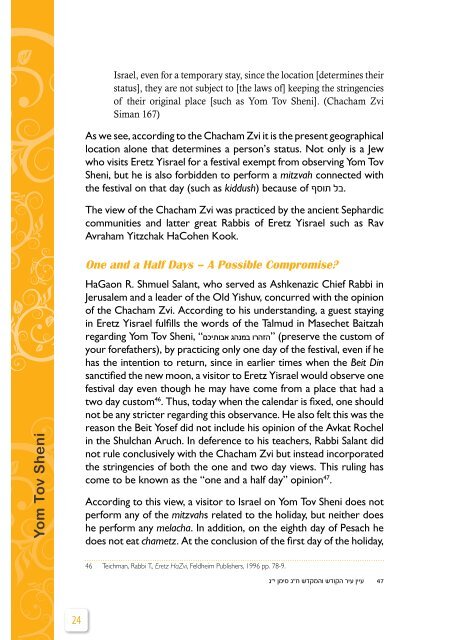Y om T o v Sheni Yom Tov Sheni - Chidushei Torah@NDS
Y om T o v Sheni Yom Tov Sheni - Chidushei Torah@NDS
Y om T o v Sheni Yom Tov Sheni - Chidushei Torah@NDS
You also want an ePaper? Increase the reach of your titles
YUMPU automatically turns print PDFs into web optimized ePapers that Google loves.
Y<strong>om</strong> <strong>Tov</strong> <strong>Sheni</strong><br />
24<br />
Israel, even for a temporary stay, since the location [determines their<br />
status], they are not subject to [the laws of] keeping the stringencies<br />
of their original place [such as Y<strong>om</strong> <strong>Tov</strong> <strong>Sheni</strong>]. (Chacham Zvi<br />
Siman 167)<br />
As we see, according to the Chacham Zvi it is the present geographical<br />
location alone that determines a person’s status. Not only is a Jew<br />
who visits Eretz Yisrael for a festival exempt fr<strong>om</strong> observing Y<strong>om</strong> <strong>Tov</strong><br />
<strong>Sheni</strong>, but he is also forbidden to perform a mitzvah connected with<br />
the festival on that day (such as kiddush) because of ףסות לב.<br />
The view of the Chacham Zvi was practiced by the ancient Sephardic<br />
c<strong>om</strong>munities and latter great Rabbis of Eretz Yisrael such as Rav<br />
Avraham Yitzchak HaCohen Kook.<br />
One and a Half Days – A Possible C<strong>om</strong>pr<strong>om</strong>ise?<br />
HaGaon R. Shmuel Salant, who served as Ashkenazic Chief Rabbi in<br />
Jerusalem and a leader of the Old Yishuv, concurred with the opinion<br />
of the Chacham Zvi. According to his understanding, a guest staying<br />
in Eretz Yisrael fulfills the words of the Talmud in Masechet Baitzah<br />
regarding Y<strong>om</strong> <strong>Tov</strong> <strong>Sheni</strong>, “םכיתובא גהנמב ורהזה” (preserve the cust<strong>om</strong> of<br />
your forefathers), by practicing only one day of the festival, even if he<br />
has the intention to return, since in earlier times when the Beit Din<br />
sanctified the new moon, a visitor to Eretz Yisrael would observe one<br />
festival day even though he may have c<strong>om</strong>e fr<strong>om</strong> a place that had a<br />
two day cust<strong>om</strong> 46 . Thus, today when the calendar is fixed, one should<br />
not be any stricter regarding this observance. He also felt this was the<br />
reason the Beit Yosef did not include his opinion of the Avkat Rochel<br />
in the Shulchan Aruch. In deference to his teachers, Rabbi Salant did<br />
not rule conclusively with the Chacham Zvi but instead incorporated<br />
the stringencies of both the one and two day views. This ruling has<br />
c<strong>om</strong>e to be known as the “one and a half day” opinion 47 .<br />
According to this view, a visitor to Israel on Y<strong>om</strong> <strong>Tov</strong> <strong>Sheni</strong> does not<br />
perform any of the mitzvahs related to the holiday, but neither does<br />
he perform any melacha. In addition, on the eighth day of Pesach he<br />
does not eat chametz. At the conclusion of the first day of the holiday,<br />
46 Teichman, Rabbi T., Eretz HaZvi, Feldheim Publishers, 1996 pp. 78-9.<br />
ג”י ןמיס ג”ח שדקמהו שדוקה ריע ןייע 47


